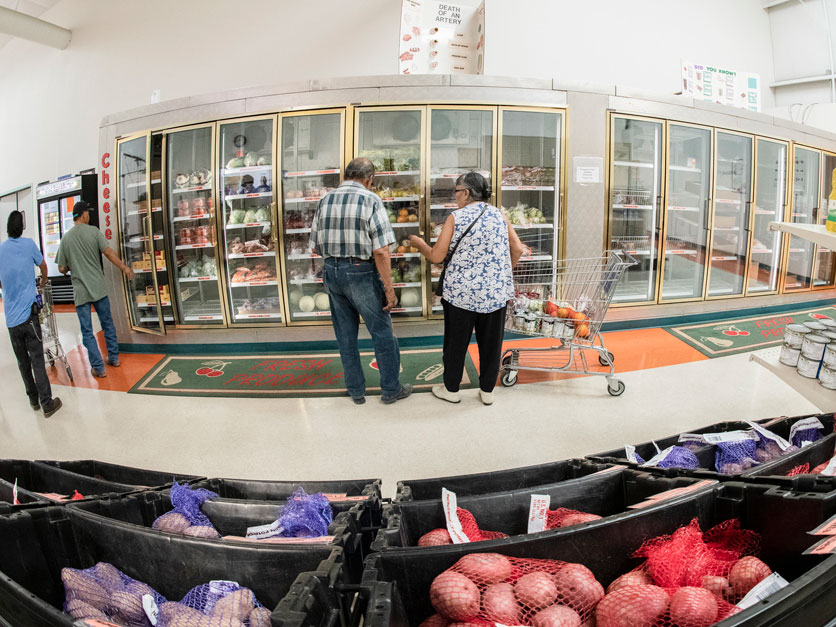Anti-hunger groups are praising Stacy Dean, deputy undersecretary for USDA’s food, nutrition and consumer services, following news of her planned departure in July.
Dean led the 2021 Biden administration’s update of the Thrifty Food Plan that sharply increased SNAP benefits for the first time in nearly 50 years.
“Her data and equity-driven approach and balanced leadership have been pivotal in strengthening and improving access to federal nutrition programs,” said the Food Research and Action Center in an emailed statement. “We commend her significant contributions to the agency, commitment to maintaining the integrity of USDA's internal review processes, and her openness to engaging with a variety of stakeholders in the fight against hunger in the U.S.”
Georgia Machell, interim president and CEO of the National WIC Association highlighted Dean's work to modernize WIC and secure funding for state and local WIC offices to expand access.
"Thanks to these and other vital efforts, Deputy Undersecretary Dean's impact on WIC will long outlast her tenure at USDA," said Machell in a statement. "While her departure is a loss for the country, we look forward to continuing to work with Secretary Vilsack, FNS Administrator Long, and the rest of the team at USDA that has been so supportive of WIC and other federal nutrition programs." Cindy Long is administrator of the Food and Nutrition Service.
FDA proposes traceability exemption for some cottage cheese
FDA has proposed an exemption for some cottage cheese products from traceability regulations set to take effect in 2026.
The food traceability rule under the Food Safety Modernization Act requires additional recordkeeping for some foods to help identify and remove potentially contaminated products from the market. A range of items are covered by the rule, including leafy greens, nut butters and a variety of cheeses.
The proposed exemption applies to cottage cheese regulated under the Grade “A” pasteurized milk ordinance. Cottage cheese produced in the U.S. is largely regulated by the National Conference on Interstate Milk Shipments, which has coordinated with FDA to create an Interstate Milk Shippers Program to ensure the sanitary quality of milk products.
FDA is accepting public comments on the proposed exemption until Sept. 12.
Western Dems seek disaster aid for farmworkers
Four Democratic senators from Western states have introduced a bill that would offer grants to farm workers after natural disasters.
The Disaster Relief for Farm Workers Act — proposed by Sens. Michael Bennet, D-Colo., Alex Padilla, D-Calif., Andrea Salinas, D-Colo., and Zoe Lofgren, D-Calif. — is based on one of the recommendations put forward by members of USDA’s Equity Commission in a report earlier this year.
The bill would also require USDA to develop and execute a promotional plan for the program, which would make disaster grants available to farmworker organizations. A one-page summary of the bill notes that "existing federal disaster relief programs insufficiently compensate farm workers when they lose wages as a result of conditions out of their control."
Data suggest free school meals improve food sufficiency
A USDA study suggests that universal free school meals can improve food insecurity among kids in households of modest incomes.
The study by the Economic Research Service using U.S. Census survey data found food insufficiency among school-aged children was 1.5 percentage points higher in states that didn’t provide free meals to all kids. Given that the average food insufficiency rate was 15.3% before universal school meals, that’s a difference of about 10%.
All kids nationwide were offered free meals during the pandemic, but only six states – California, Connecticut, Maine, Massachusetts, Nevada, and Vermont – continued that policy in the 2022-2023 school year.
It's easy to be "in the know" about agriculture news from coast to coast! Sign up for a FREE month of Agri-Pulse news. Simply click here.
Take note: The study said the improvement in food sufficiency was driven by families just above the eligibility threshold for free and reduced-price meals. Kids in families with incomes up to 185% of the federal poverty line are eligible for free and reduced-price meals under federal policy. The poverty line for a family of four in 2024 is $31,200.
Virus reduced in raw milk through heat treatment
Scientists at the National Institute of Allergy and Infectious Diseases have found that heat treatment is effective at significantly reducing the amount of avian influenza virus in raw milk.
However, they caution that their test is experimental because they spiked samples of raw milk with the virus. They say their measurements “should be replicated with direct measurement of infected milk in commercial pasteurization equipment,” a press release on their research said. The results “should not be used to draw any conclusions about the safety of the U.S. milk supply.”
They say that “although gastrointestinal infections with [Highly Pathogenic Avian Influenza] H5N1 have occurred in several species of mammals, it remains unknown whether ingesting live H5N1 in raw milk could cause illness in people.”
Herds with infection grow: Iowa reported infection in another dairy herd in Sioux County Saturday, and Colorado’s county of infected herds grew by six last week. Seven herds in that state are under quarantine. The number of herds that have been infected is now more than 100 in 12 states.
By the way: In this week’s Agri-Pulse Open Mic interview, the president and CEO of the National Milk Producers Federation, Gregg Doud, says testing of pasteurized milk has confirmed the safety of the U.S. milk supply, despite the avian flu infections.
“The tests have been run. The analysis has been done. We've been using pasteurization and milk for over 100 years, and the results are this takes care of the issue of milk safety for US consumers,” Doud says.
In the interview, Doud also talks about the farm bill and milk marketing order reform.
Rebekah Alvey, Noah Wicks and Philip Brasher contributed to this report.


